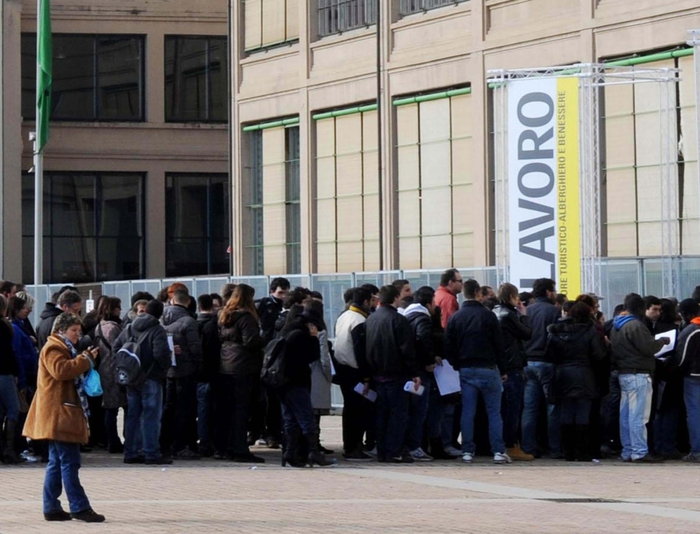Agency for employment and the job center: "Overall, the negative sides of self-employment should be addressed more intensively"
Photo: Jan Woitas/ dpa
A job center in Kaiserslautern is looking for specialists for further training measures for integration into the German labor market "for people with mainly migration-related obstacles".
So far so good.
The aim of the measures is the successful "placement and subsequent stabilization of employment subject to compulsory insurance, as well as information about self-employment in Germany".
That's great, of course, because digitization and actually the entire 21st century with its achievements and problems require new forms of work, new flexibility and new ways of thinking.
The Kaiserslautern job center has published an advertisement for this.
It consists of twelve PDFs, some with over twenty pages, and an AIDF file, a special file for opening a Java-based tendering tool from a private company.
The fourth version of the documents has now been published and they are all still online, so that a collection of fifty-two files now outlines the tender and its history.
This is advantageous, as one is already attuned to the German labor bureaucracy when looking at it.
And hidden on page 21 of 23 in the document tender documents/Version3/B_Performance_Description_Stand_06.07.2022.pdf , that conceals a grenade-like official impertinence of the special class.
This imposition primarily affects the self-employed,
in the second place, however, the whole country including the coming generations.
And unfortunately that's not an exaggeration.
Because in the section “Contents of the measure and their quality standards”, the Kaiserslautern job center formulated:
»Self-employment as an alternative to a regular job should be viewed very critically during the measure. ... The disadvantages of self-employment should be clearly emphasized here ... Overall, the negative aspects of self-employment should be addressed more intensively. possibly guest speakers can be called in during the measure to clarify the disadvantages, who report on their negative experiences with self-employment.«
If that were a single, unsuccessful (and meanwhile changed) passage, one could still be outraged.
One could discuss a possible chauvinistic or even racist undertone, which in principle wants to make migrants self-employed mad.
Unfortunately, that's not just a startling phrase, luckily spotted by entrepreneurial activist Catharina Bruns.
Rather, it is a moment in which a German attitude that is seldom implicitly expressed but omnipresent becomes apparent: the rejection of independence by large sections of the state apparatus and also by a section of the public.
Germany is the most employed country in the world, at least as far as the mindset is concerned.
In addition to the downright contempt of the self-employed by parts of politics and administration, there are various narratives of political rejection.
Conservatives often only see valuable members of society in successful self-employed people, leftists often bring with them contempt and distrust of entrepreneurial activity.
As an independent person, one can easily be branded a bum by some and an exploiter by others at the same time.
Self-employment and especially solo self-employment still seems to many people in Germany to be somehow dubious or even lazy.
And anyone who publicly admits to having had difficult phases as a self-employed person
That is why the job center's abhorrence of self-employment is particularly toxic: on the one hand, it reflects an attitude that is actually quite common in administration.
And on the other hand, it also acts as a rejection multiplier.
From the point of view of a job center under the umbrella of the Federal Employment Agency, this attitude is fundamentally cynical and presumptuous, but somehow logical: Germany could not afford too many people to work independently.
Then the social system, built on corner pensioners and social security contributions, would detonate completely.
Unfortunately, this is the great ideological motivation that makes most political lip service to self-employment unbelievable: The German welfare state is addicted to permanent jobs.
The consequences could already be seen during the pandemic, where self-employed people in particular were treated almost ridiculously in so many areas, while many large companies were solidly carried through the pandemic with short-time work.
But the legal situation is simply hostile to the self-employed in so many facets.
For example, in 2022 it is still an economic catastrophe if you become pregnant as a self-employed person.
The master carpenter Johanna Röh was faced with exactly this situation in autumn 2021 and would have slipped into insolvency without family help.
That's why she launched an e-petition calling for self-employment and pregnancy to finally be made humane.
For example, to protect women giving birth and their children, the legislator has come up with maternity leave including maternity leave - including 100 percent continued net wages six weeks before and eight weeks after the birth, at least for employees with statutory insurance.
Except for the self-employed, for whom there is no maternity leave or "holiday" and of course no continued payments.
As a rule, privately insured self-employed persons do not even receive maternity benefit.
But even self-employed people with statutory insurance only get it if they have signed a special tariff.
It goes on and on like this, you shouldn't deal with it too intensively, otherwise you'll wonder how the self-employed have had children at all and why single self-employed mothers haven't set everything on fire long ago.
The German state must finally and comprehensively abolish its fundamentally anti-independent, radically fixed position work ideology.
Permanent employment must no longer be viewed as a form of work with no alternative, with individual self-employed outliers.
The self-employed must no longer be discriminated against and ridiculed.
The job center debacle outlined above shows once again that these demands must not only be anchored in law, but also in the minds of society.
And this is necessary because work itself has changed massively as a result of digital networking and is still changing.
On average, it is becoming more knowledge-based, collaborative, dialogical, faster and more efficient.
This requires much more flexibility, innovation orientation, willingness to learn and entrepreneurial thinking.
Incidentally, this is the only way, with a positive focus on independence and entrepreneurial spirit, that new start-ups can arise, which are very small at the beginning and eventually feed the continent.
And that is why self-employment, especially in networks, combined with mixed forms of permanent employment and self-employment, are the forms of work of the future.
Actually of the present, but that always takes a little longer in Germany than elsewhere.
Because Germany can be as rich as it wants – by far the greatest German wealth remains inertia.







